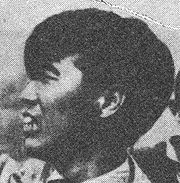- Pei Wenzhong
-
Pei Wenzhong
Pei Wenzhong (chino: 裴文中, inglés W. C. Pei, 5 de marzo 1904 – 18 de septiembre 1982) fue un paleontólogo, arqueólogo y antropólogo chino.[1] Pei se considera el fundador de la antropología china. Se graduó en la Universidad de Pekín en 1928 y trabajó en el Cenozoic Research Laboratory (Laboratorio de Investigación Cenozoica) en Zhoukoudian. El primer cráneo del El hombre de Pekín (una parte superior) fue encontrado por Pei "en una profunda grieta de 40 m, donde Pei trabajaba, con un martillo en una mano y una vela en la otra"[2] el 1 de diciembre 1929, a las 4 p. m.[3]
En 1935, Pei se graduó en la Universidad de París, y en 1955 fue miembro de la Academia China de las Ciencias. Pei escribió varios libros, entre ellos el primer libro dentro la prehistoria de China, que lo escribió en chino.[1] Pei murió en 1982 y después de una cremación fue sepultado en Zhoukoudian, como sus colegas Yang Zhongjian y Jia Lanpo.
Véase también
Referencias
- ↑ a b Fiore, C.; Shaw, J. (1984). «Obituary W. C. Pei (1904-1982)» American Anthropologist. Vol. 86. n.º 115.
- ↑ Melvin, Sheila (2005). «Archaeology: Peking Man, still missing and missed» International Herald Tribune.
- ↑ Josef Kleibl. «Cesta za Adamem (The Road to Adam)», Prague.
Categorías: Científicos de China | Profesores de China | Nacidos en 1904 | Fallecidos en 1982
Wikimedia foundation. 2010.

